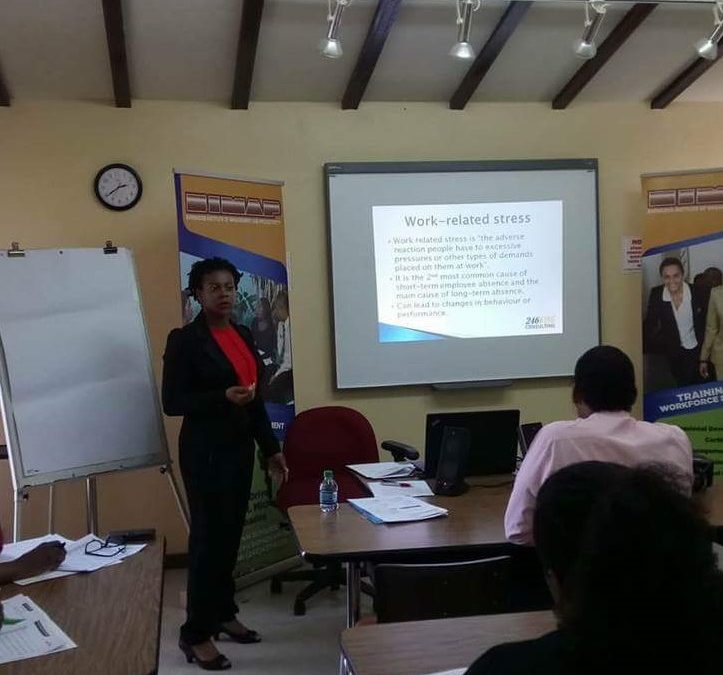The UK Health and Safety Executive (HSE) defines work-related stress as “the adverse reaction people have to excessive pressures or other types of demand places on them at work”. Individuals can become stressed when they perceive they don’t have the resources needed to cope with these demands.
Stress is considered the 2nd most common cause of short-term employee absence while it is the main cause of long-term absence. According to findings of the Chartered Institute of Personnel and Development (CIPD), nearly a third of organisations report an increase in stress-related absence in 2016 and two-fifths a rise in reported mental health problems. The most common cause of stress-related absence is workload and long working hours which are associated with increases in reported mental health problems. About a quarter of the surveyed organisations have a clear policy which covers mental health and a much smaller proportion has a standalone policy. Actively promoting good mental well-being and encouraging openness and awareness about mental health are essential. Other causes include lack of managerial support and management style, poor working relationships, hostile work environment and a large amount of organisational change or restructuring.
Work-related stress can lead to changes in behaviour or performance. Some of these changes include:-
- Declining/inconsistent performance
- Lack of motivation or commitment
- Indecision
- Memory lapses
- Irritability/moodiness
- Overreaction to problems
- Immature behaviour
- Shouting
- Temper outbursts
- Out of character behaviour
- Difficulty relaxing
- Anxiety
- Sleeplessness
- Increased consumption of alcohol
- Increased smoking
- Lack of interest in appearance/hygiene
- Reckless driving
- Sweating
- Tiredness/lethargy
- Upset stomach/flatulence
- Tension headaches
- Rapid weight gain or loss
A 24/7 independent, confidential employee helpline is a positive way to address any stress and anxiety an employee may be experiencing. An effective helpline will cover areas such as stress, health and well-being, work and career, debt concerns, bereavement, relationships, work/life balance, financial management, relationships, redundancy and family care. An employee assistance programme which also includes the offer of face to face counselling sessions is deemed more beneficial.
Research has found that millennials suffer from work stress the most and work stress decreases with age. A key concern is that over a quarter of those affected by work stress are equally as likely to turn to alcohol and cigarettes as they are to talk to someone about their issues and even more worrying is some turn to narcotics as a stress reliever.
It has been found that men suffer from work stress more than women. There is a belief that this may be because men are more likely to internalise and are not be open as women to talk about their feelings, worries or concerns. Typically, some women have more of a core support system which includes close friends, family and work colleagues.
It is clear that prevention and early intervention are the best ways of addressing and reducing work-related stress. It is recommended that organisations ensure that people feel sufficiently trained and supported to do their jobs well and there is increased support for staff during periods of change and uncertainty, e.g. restructures, mergers and acquisitions and Transfer of Undertakings (Protections of Employment) regulations (TUPE).
If the organisational culture is supportive and employees feel they can raise a problem and managers are confident and capable of addressing the issue then early intervention could be more likely. Organisations are encouraged to develop the management skills and confidence of their managers so they can have the necessary conversations with employees and train mangers to be able to notice changes in individuals’ work styles and behaviour.
It is vitally important that organisations build employee resilience to life’s pressures and have workplace initiatives that help people manage stress and enable them to perform to their best ability long-term.
Ms. Jolene King has over 15 years business management and HR international experience gained in the UK, USA and Barbados. She holds a MA degree in Human Resource Management from University of Derby, a MSc. degree in Industrial/Organisational Psychology from Florida Institute of Technology and a BSc. degree in Sociology with Psychology from University of the West Indies, Cave Hill. Ms. King is an active committee member of the Chartered Institute of Personnel and Development’s (CIPD) Northamptonshire branch and is an Associate member of the Society for Industrial and Organisational Psychology (SIOP).

